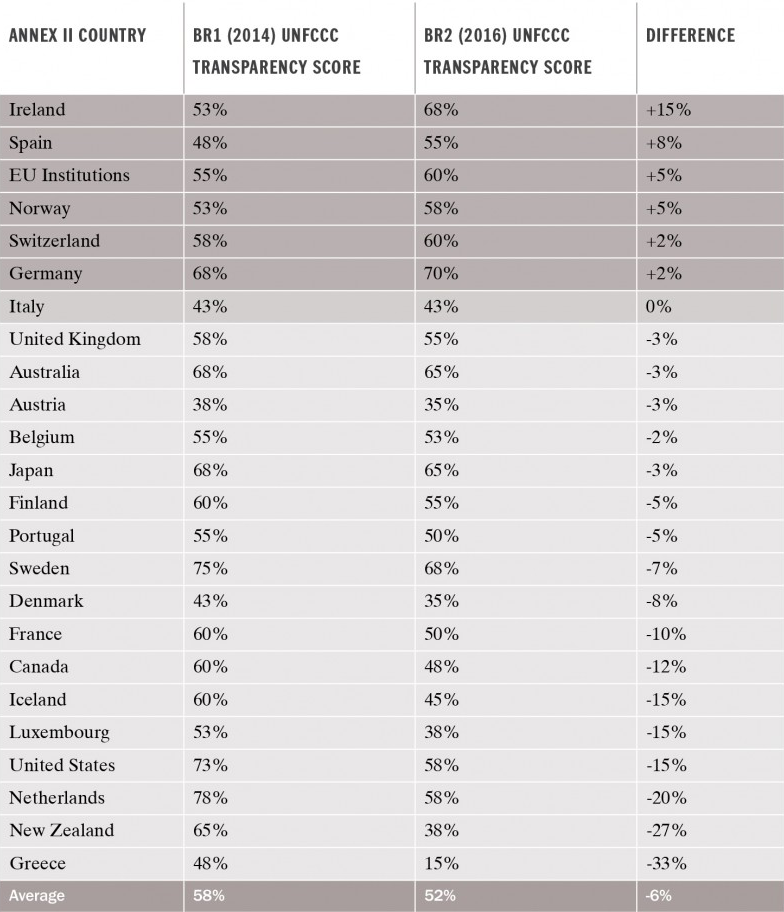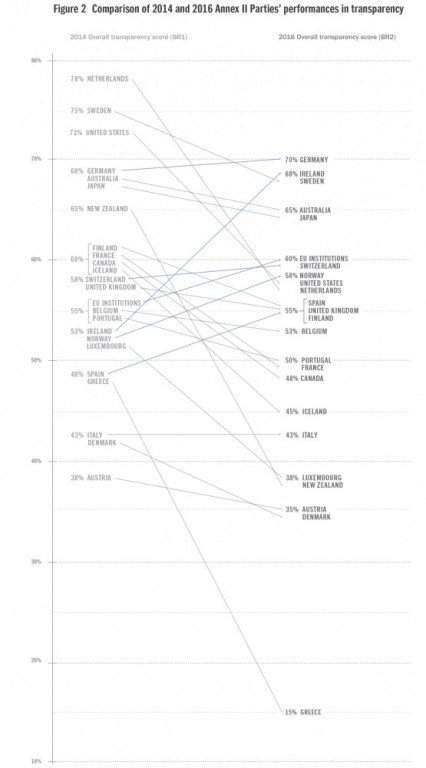
The group, comprised of 13 organisations around the world, found that donor countries' average level of compliance toward UNFCCC climate finance transparency requirements declined from a poor average of 58% for reports filed in 2014 to an even worse mean of 52% in 2016.
Lead author Dr Romain Weikmans, Free University of Brussels, expressed concern, saying: "We have a reality that does not match the rhetoric that came out of the Paris negotiations. While donor countries claim they are working toward a more transparent climate finance process, instead we see that they continue to struggle to meet even basic UNFCCC guidelines, with transparency falling year on year. I hope this is not a trend."
 Of all the countries mapped against the UNFCCC reporting requirements, Germany has emerged as the most transparent, which is in line with their recent political moves to take a lead on global initiatives. Both chambers of German Parliament committed to comply with the Paris Agreement ahead of the European bloc voting to ratify the agreement at the end of last month, and as one of the first countries to submit reporting data to the UN,Germany has also sought a leading role in implementing the SDGs, and has decided to make its National Sustainable Development Strategy a key framework for achieving the SDGs in Germany.
Of all the countries mapped against the UNFCCC reporting requirements, Germany has emerged as the most transparent, which is in line with their recent political moves to take a lead on global initiatives. Both chambers of German Parliament committed to comply with the Paris Agreement ahead of the European bloc voting to ratify the agreement at the end of last month, and as one of the first countries to submit reporting data to the UN,Germany has also sought a leading role in implementing the SDGs, and has decided to make its National Sustainable Development Strategy a key framework for achieving the SDGs in Germany.
The countries assessed in the report are Australia, Austria, Belgium, Canada, Denmark, the European Union, Finland, France, Germany, Greece, Iceland, Ireland, Italy, Japan, Luxembourg, the Netherlands, New Zealand, Norway, Portugal, Spain, Sweden, Switzerland, United Kingdom and the United States.
Prof. J. Timmons Roberts, Head of Brown University's Climate and Development Lab and a Co-Founder of AdaptationWatch said: "If we were giving awards to the donor countries, Germany would receive ‘Most Valuable Player' and Ireland would win ‘Most Improved.' Meanwhile the biggest backslider in transparency terms is Greece, which has dropped from 48% to 15% and the three countries gracing the wall of shame are Greece, Austria and New Zealand."
 The Paris Agreement that came out of the UN climate talks is an improvement on previous accords and includes substantial language on transparency. However it still lacks clear procedures for reporting on funding and resources to flow to developing countries for adaptation in ways that are both reliable and transparent.
The Paris Agreement that came out of the UN climate talks is an improvement on previous accords and includes substantial language on transparency. However it still lacks clear procedures for reporting on funding and resources to flow to developing countries for adaptation in ways that are both reliable and transparent.
Co-author Dr. Saleemul Huq, Director of International Centre for Climate Change and Development said: "The implementation of the Paris Agreement depends on all countries fulfilling their promises and obligations in a fully transparent manner. Those developed countries providing finance to tackle climate change in developing countries must be fully transparent in providing information on what and who is being funded. So far they are not doing that well enough."
Climate finance is at the core of the UNFCCC's efforts to help the developing world adequately adapt to climate change, and is absolutely critical to poor countries' abilities to prepare and protect themselves from climate change's impacts. Transparency in the reporting of climate finance is crucial for building and maintaining trust among nations if the international community is to reach agreement on solving the existential problem of climate change.
Despite this, information on adaptation funding has sometimes been deliberately obscured in the past – causing the researchers to term the existing reporting system as ‘lawless' in their previous report – something that will likely continue if stronger funding, reporting guidelines and significant capacity building are not implemented.
Key recommendations from the researchers include:
- Create a clear and universal system of accounting modalities for climate finance. The most fundamental task is to decide what counts as adaptation and mitigation.
- Continue project tracking and data checking from the OECD CRS system, but discontinue the Rio Marker categorization system.
- Develop an online tracker for climate finance, that is universally accessible, comprehensive, and user-friendly, so recipient and donor countries can be equally accountable.
Roberts added: "We have some ideas on how to fix this very serious problem. The Paris Capacity Building Initiative for Transparency can be part of a step change to a globally accountable tracking method by 2020, in time to support the Paris Agreement commitments as they begin. The global stocktakes should include clear and complete information on how climate finance is being delivered and used."